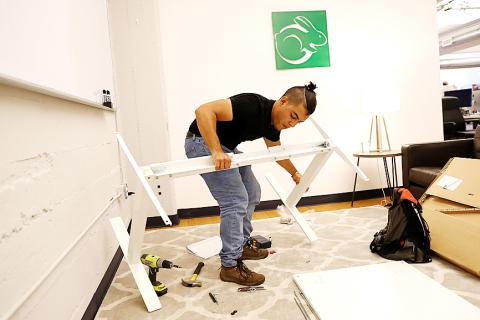IKEA is to expand tests to allow customers to rent desks and sofas rather than buy them as it shifts away from selling low-cost disposable furniture in response to growing environmental concerns.
The world’s biggest furniture group first said in February that it was looking into furniture leasing. It fleshed out its plans yesterday at an event held at its first “sustainable” store in Kaarst, western Germany, which opened in 2017.
“Testing out opportunities for leasing offers is one of the ways we are challenging ourselves to deliver on our transformation strategy,” said Jesper Brodin, chief executive officer of Ingka Group, which owns most IKEA stores.

Photo: Reuters
“Climate change and unsustainable consumption are among the biggest challenges we face in society,” he said.
IKEA’s move toward supporting a more circular economy comes as many young consumers say they want to minimize their impact on the environment, preferring to rent items ranging from clothing to cars.
Its business model has already come under pressure from the rise of online retail and a growing reluctance among younger shoppers to travel to its vast out-of-town stores, get the flat-pack furniture home and assemble it themselves.
Rent the Runway, which has previously only rented out designer apparel and accessories, last month said it would partner with Williams-Sonoma Inc’s West Elm brand to allow subscribers to rent home decor.
IKEA, which had global sales of 39 billion euros (US$44 billion) last year, said it wants to develop subscription-based leasing offers to encourage products to be reused as many times as possible before being recycled.
It had already committed to make all its products from renewable and recycled materials by 2030, and to design all its products to be reused, repaired and recycled. Last year, it handled 1 million orders for spare parts to repair products.
IKEA has already started testing different furniture rental projects in the Netherlands, Sweden, Switzerland and Poland, and aims to expand the tests to all its 30 markets next year.
In Sweden and Switzerland, it is looking into providing furniture to companies on a subscription model, while in the Netherlands it is testing a rental package for students in cooperation with a housing association.

To many, Tatu City on the outskirts of Nairobi looks like a success. The first city entirely built by a private company to be operational in east Africa, with about 25,000 people living and working there, it accounts for about two-thirds of all foreign investment in Kenya. Its low-tax status has attracted more than 100 businesses including Heineken, coffee brand Dormans, and the biggest call-center and cold-chain transport firms in the region. However, to some local politicians, Tatu City has looked more like a target for extortion. A parade of governors have demanded land worth millions of dollars in exchange

An Indonesian animated movie is smashing regional box office records and could be set for wider success as it prepares to open beyond the Southeast Asian archipelago’s silver screens. Jumbo — a film based on the adventures of main character, Don, a large orphaned Indonesian boy facing bullying at school — last month became the highest-grossing Southeast Asian animated film, raking in more than US$8 million. Released at the end of March to coincide with the Eid holidays after the Islamic fasting month of Ramadan, the movie has hit 8 million ticket sales, the third-highest in Indonesian cinema history, Film

Taiwan Semiconductor Manufacturing Co’s (TSMC, 台積電) revenue jumped 48 percent last month, underscoring how electronics firms scrambled to acquire essential components before global tariffs took effect. The main chipmaker for Apple Inc and Nvidia Corp reported monthly sales of NT$349.6 billion (US$11.6 billion). That compares with the average analysts’ estimate for a 38 percent rise in second-quarter revenue. US President Donald Trump’s trade war is prompting economists to retool GDP forecasts worldwide, casting doubt over the outlook for everything from iPhone demand to computing and datacenter construction. However, TSMC — a barometer for global tech spending given its central role in the

Alchip Technologies Ltd (世芯), an application-specific integrated circuit (ASIC) designer specializing in server chips, expects revenue to decline this year due to sagging demand for 5-nanometer artificial intelligence (AI) chips from a North America-based major customer, a company executive said yesterday. That would be the first contraction in revenue for Alchip as it has been enjoying strong revenue growth over the past few years, benefiting from cloud-service providers’ moves to reduce dependence on Nvidia Corp’s expensive AI chips by building their own AI accelerator by outsourcing chip design. The 5-nanometer chip was supposed to be a new growth engine as the lifecycle